What Did You Do in the Great Theatre Shutdown.....?
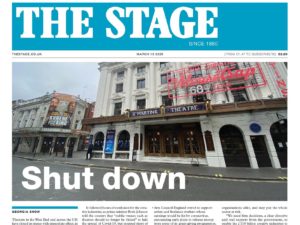 Following the order in March 2020 for theatres to close because of the Covid-19 pandemic, thousands of actors were thrown out of work or denied the prospect of finding work in the foreseeable future. The Society suffered collateral damage in that the 2020 Poel Workshop, which relied heavily on ensemble work and the use of the Olivier stage at the National Theatre, was postponed. When in July it became clear that it would have to be cancelled altogether, we wondered what those 40 actors who had applied for places on the Workshop had been doing to help keep theatre – and themselves – alive for those five months. So we invited them, and Poel Workshop alumni from earlier years, to tell us about their experience of the Great Theatre Shutdown.
Following the order in March 2020 for theatres to close because of the Covid-19 pandemic, thousands of actors were thrown out of work or denied the prospect of finding work in the foreseeable future. The Society suffered collateral damage in that the 2020 Poel Workshop, which relied heavily on ensemble work and the use of the Olivier stage at the National Theatre, was postponed. When in July it became clear that it would have to be cancelled altogether, we wondered what those 40 actors who had applied for places on the Workshop had been doing to help keep theatre – and themselves – alive for those five months. So we invited them, and Poel Workshop alumni from earlier years, to tell us about their experience of the Great Theatre Shutdown.
THE SHOW MUST GO ONLINE

 ROBERT MYLES describes himself as an actor-director-writer of working-class origins. He has been performing for over a decade, mainly in Shakespeare, and is the author of The Shakespeare Deck, a text-work exploration tool for actors. He was an applicant for the 2020 Poel Workshop.
ROBERT MYLES describes himself as an actor-director-writer of working-class origins. He has been performing for over a decade, mainly in Shakespeare, and is the author of The Shakespeare Deck, a text-work exploration tool for actors. He was an applicant for the 2020 Poel Workshop.
I like so many others lost work as the pandemic hit, and it hasn’t recovered since. I chose to take solace in Shakespeare. I sent a tweet of my intention to start a Shakespeare reading group, streamed live. It went viral, and friends rallied around to turn an idea into an inclusive, joyful, global project.
Since the first show on March 16th, I have endeavoured to direct the complete works of Shakespeare, broadcast live via YouTube to a global audience, every week. The Show Must Go Online has now reached the half-way point in the canon: I have read, edited, researched and directed 18 Shakespeare plays in 18 weeks, winning two OnComm Awards so far in the process. The project has created a global movement, working with over 300 actors, attracting over 150,000 views, and live audiences of 150-250 every week. The shows have been featured on BBC Newsnight twice, in The Guardian, Playbill and other global media, and has attracted multiple 5- and 4-star reviews.
I have worked harder than ever in lockdown, with actors of all levels of experience, from veterans of The National, The RSC, Shakespeare’s Globe and Shakespeare In The Park NY, to those who have never read Shakespeare aloud before, from 6 of the 7 continents.. The project has established a Patron opt-in hardship fund for all those who take part.
This is not sustainable economically: I make no money from this and we don’t receive funding due to the model not matching the criteria of funding bodies. But I see what I’m doing as investing in my future by undertaking a marathon of professional development, accruing years of experience in months. The project has stretched me as a director and I have grown so much every single week. Similarly, I’ve learned from every actor that has come through the door how to be a better performer myself.
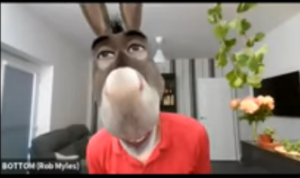 I even participated in A Midsummer Night’s Dream, as Bottom.
I even participated in A Midsummer Night’s Dream, as Bottom.
A WISE CHILD AND A LITTLE ANGEL
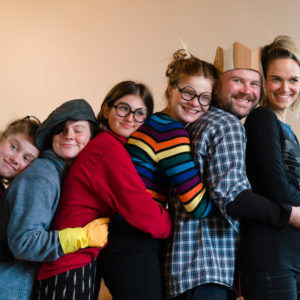
 PHOEBE HYDER was a 2020 Poel Workshop applicant. As well as performing as an actress she creates much work as a puppeteer, movement director and puppetry director, working across stage and screen.
PHOEBE HYDER was a 2020 Poel Workshop applicant. As well as performing as an actress she creates much work as a puppeteer, movement director and puppetry director, working across stage and screen.
As an actress at the very start of her career I found it hard to comprehend but also grieve for something that I was only just getting my foot in the door of. Many early-career artists like myself have felt the blow of lockdown harder than most established artists for the very simple reason of not being established… it’s back to the beginning as you try to build up the momentum and network you were just getting a grasp on. But despite the lack of ‘in the room’ opportunities and the prospect of tangible future work, lockdown has presented me with some awesome ways to keep theatre alive that wouldn’t have come about otherwise.
Firstly, I was part of theatre company Les Enfants Terribles’s creation Prism, an online theatre production, along with a collated cast of 2-3 minute clips from artists all over the country. These were made in isolation by the artists, the brief being: ‘a world to escape to’ and from there you could run wild. As a puppeteer, my world was of pictures coming to 3D life before your eyes, while others created hilarious characters and bizarre worlds. The project is all spun together in a web that the audience can navigate at their own will and can enter to escape the lockdown fog whenever necessary.
Next, for me keeping theatre alive means developing your practice and I had the phenomenal opportunity to do just that by being part of Emma Rice’s: ‘School for Wise Children Summer Spread’. I received a place on the Movement Direction course via Zoom headed by Etta Murfitt. Coming out of lockdown I think the need to diversify your work and be as multidisciplinary as possible will be paramount to getting employed and surviving, so having this opportunity, time and space to develop my work as a movement director is something I’m incredibly grateful for. A happy surprise presented by lockdown!
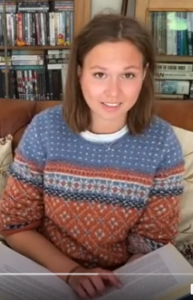 Then, Little Angel Theatre is a special place for many; it was one of my first employers when leaving drama school and is an important theatrical corner stone for many schools and children across the country. The theatre receives zero government funding so during lockdown, in both a campaign to get donations but also to continue providing theatre for families, freelancers from LAT were asked to record themselves reading a children’s story for the theatre’s media channels. I had the pleasure of reading ‘The Little Match Stick Girl’ which I enjoyed revisiting immensely. Over lockdown Little Angel have released 18 weeks worth of resources, videos, online puppetry shows, making tutorials, courses and stories – all free to enjoy; an amazing feat to have been a part of.
Then, Little Angel Theatre is a special place for many; it was one of my first employers when leaving drama school and is an important theatrical corner stone for many schools and children across the country. The theatre receives zero government funding so during lockdown, in both a campaign to get donations but also to continue providing theatre for families, freelancers from LAT were asked to record themselves reading a children’s story for the theatre’s media channels. I had the pleasure of reading ‘The Little Match Stick Girl’ which I enjoyed revisiting immensely. Over lockdown Little Angel have released 18 weeks worth of resources, videos, online puppetry shows, making tutorials, courses and stories – all free to enjoy; an amazing feat to have been a part of.
Lockdown, with its abrupt stopping, has enforced a sense of calm perspective and time to reflect upon your practice as an artist. I’m looking forward to seeing how our industry slowly starts to reopen, as we gradually move out of lockdown and hopefully towards finding a vaccine. Perhaps that’s one last thing lockdown has surprised me with, how artists all over the country have embraced and reignited an open-hearted giving nature towards the work and others… something we can all agree our industry has been well overdue an injection of!
RICHARD II IN A QUANDARY
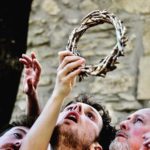
 ANNIE McKENZIE, actor, writer, director and MasterChef semi-finalist, can be heard on Season 14 of BBC Radio 4’s ‘Home Front’ as Nurse Betty Newcombe. She founded immersive dining company Scripts for Supper in 2017, and is co-founder of Quandary Collective, a new female led theatre company making bold adaptations of well-known stories and “striving to find ways to connect with one another, human to human, with honesty and clarity because the whole world is in a bit of a quandary at the moment, but perhaps together we can claw our way out”. Annie was an applicant for Poel Workshop 2020.
ANNIE McKENZIE, actor, writer, director and MasterChef semi-finalist, can be heard on Season 14 of BBC Radio 4’s ‘Home Front’ as Nurse Betty Newcombe. She founded immersive dining company Scripts for Supper in 2017, and is co-founder of Quandary Collective, a new female led theatre company making bold adaptations of well-known stories and “striving to find ways to connect with one another, human to human, with honesty and clarity because the whole world is in a bit of a quandary at the moment, but perhaps together we can claw our way out”. Annie was an applicant for Poel Workshop 2020.
What do you do when two years’ worth of work meant to culminate in a Central London industry showing of your brand new adaptation of William Shakespeare’s Richard II gets cancelled 48 hours before the event because of a global pandemic? Why, you make a short film, of course!
That is what we say to ourselves, early in the morning on Tuesday 17th March 2020 after a brilliant, exhausting, liberating two week R&D with the cast and creative team behind Quandary Collective. Our new version of Richard II is set in a post-pandemic, post-Civil War England, where a global ecological collapse has meant a return to caveman violence and feudal law. There is a war brewing, and the politics of old and young grapple with each other to maintain a fragile peace. So… a bit like living in Britain today, then?
The Company – and the idea – came into being over pizza one night several years ago, as I asked my co-founder Coco Maertens which character she would most like to play in all the world. She said Richard II, and the rest is history.
So when we realise this Covid-19 thing is here to stay, and the future of the whole world rather than just the future of our play looks uncertain, we get savvy.
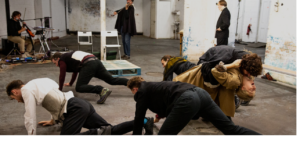 We get all of the actors who are available and willing to travel to meet for one final day of filming at Cuckoo Bang Studios in Bermondsey, and we get to work. We film everything from Bushey’s violent death to “This royal throne of Kings” and all the parts in between. I remember that day being frightening, overwhelming and anxiety provoking. None of us knew what was going on. We had never lived through such uncertain times – and that’s saying a lot when most of us have spent our lives working as freelance creatives!
We get all of the actors who are available and willing to travel to meet for one final day of filming at Cuckoo Bang Studios in Bermondsey, and we get to work. We film everything from Bushey’s violent death to “This royal throne of Kings” and all the parts in between. I remember that day being frightening, overwhelming and anxiety provoking. None of us knew what was going on. We had never lived through such uncertain times – and that’s saying a lot when most of us have spent our lives working as freelance creatives!
But we did it. We left that room on a cold, wet March evening with two SD cards full of footage. Exactly 4 months later, after Coco’s countless edits, our going a little bit crazy a few too many times, barrels of laughter, buckets of tears, and a world that looks mighty different now to how it did when we started this thing, and we had made the short film. We had made a show pack. We found a way to sell our show.
If I’ve learned anything from this past year, it’s that patience, tenacity and faith are of the utmost importance. I believe in my Company. I believe in my work, I believe in myself. I believe in the show. It doesn’t matter when and it doesn’t matter how, but it will happen. Audiences will see our work, because, ‘For heaven’s sake let us sit upon the ground and tell sad stories of the death of kings’.
If you fancy taking a sneak peek at what it is we do, visit our website or follow us on Instagram@Quandarycollective – we’d love to hear from you.
Stay strong. We are not alone. Together, we will save the arts.
A WEREWOLF AT CHRISTMAS
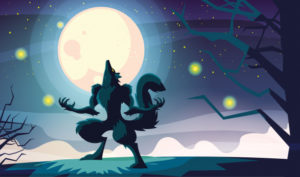
 KATHERINE RODDEN has been in the business for some 12 years now, as an actor in theatre, film and radio. She took part in the 2015 Poel Workshop. Here she gives us a taste of what the shutdown has meant to her and how she has kept busy during it.
KATHERINE RODDEN has been in the business for some 12 years now, as an actor in theatre, film and radio. She took part in the 2015 Poel Workshop. Here she gives us a taste of what the shutdown has meant to her and how she has kept busy during it.
I feel for all the youngsters finally coming in to the industry and being faced with all this. It’s a real test of convictions. I’ve been lucky in keeping really busy and I’m superbly grateful for that. Here are some of the highlights, with links.
I have been writing and performing a little comedy and getting some nice shout-outs on the British Comedy Guide Website. Here’s a Disney parody I did back in April: https://youtu.be/4RQQiEK1yNM
I’ve also been working with writer Sarah Pitard on a series about The Four Horsewomen of the Apocalypse, of which we have released two episodes thus far. Have a look at it at https://www.youtube.com/channel/UCa6-KifRpV3rKqhplwKmNuw
The thing that has been a real blessing to be involved with has been being the voice of the Covid 19 Memorial Forest Fund campaign.  Details here: https://covid19memorialforest.fund/
Details here: https://covid19memorialforest.fund/
In September I’m off to shoot Frost Bite, a werewolf movie set on Christmas Eve! So – the industry is still running, just slowly and carefully.
Love to all the Poel family. It was such a wonderful thing to be a part of.
THE EAGLE HAS LANDED
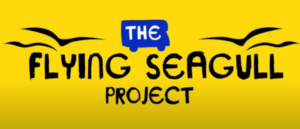
 SARITA PLOWMAN is an actress of some 20 years experience. She has worked in film, television and radio, but mainly in theatre in roles as diverse as Hermia in A Midsummer Night’s Dream to Dormouse in Mad Hatter’s Tea Party. She participated in the Poel Festival of 2004 at Shakespeare’s Globe.
SARITA PLOWMAN is an actress of some 20 years experience. She has worked in film, television and radio, but mainly in theatre in roles as diverse as Hermia in A Midsummer Night’s Dream to Dormouse in Mad Hatter’s Tea Party. She participated in the Poel Festival of 2004 at Shakespeare’s Globe.
I had the pleasure of stepping into a theatre in July and performing a show I had written and devised with the rest of the cast and performing to nearly 6000(!) school children to celebrate the end of a difficult term. How was that possible?
The Flying Seagull Project works with varying groups across the world to help bring smiles and happiness to people, whether as Clown Doctors for children undergoing difficult medical treatments or through games, arts, music and crafts workshops and circus shows. The ‘Spectacular’, the story of a redundant lighthouse keeper who embarks on a highly interactive adventure involving pirates, magic, clowning and music played to sold out audiences in Streatham in 2019. This time we performed at Applecart Arts Theatre, who have invested in three broadcast quality cameras and microphones to enable theatre to be live streamed in high quality. As soon as we heard about Applecart Arts live streaming service, we jumped on board and began rehearsing a physically distanced version of the show on a rooftop in Soho, determined for as many children as possible to see and experience our magical show!
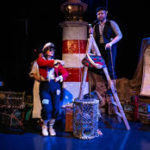 On the day, we had three camera operators, a sound technician and vision mixer who helped us create an amazing theatrical experience and I would go so far as to say, it felt like we were creating a new genre altogether (a hybrid of theatre and television). We kept the show interactive by addressing children down the camera and we even included some pre-recorded footage within the live stream as part of the story. We managed to get a great number of schools on board and played to children in Germany, Argentina and Australia as well as thousands of UK school children who were left without their usual end of term treats.
On the day, we had three camera operators, a sound technician and vision mixer who helped us create an amazing theatrical experience and I would go so far as to say, it felt like we were creating a new genre altogether (a hybrid of theatre and television). We kept the show interactive by addressing children down the camera and we even included some pre-recorded footage within the live stream as part of the story. We managed to get a great number of schools on board and played to children in Germany, Argentina and Australia as well as thousands of UK school children who were left without their usual end of term treats.
I am now about to start an open air tour of The Importance of Being Earnest with DOT Productions – this will be physically distanced and the audience is limited capacity and in ‘bubbles’.
Theatre is definitely NOT dead. Most of us storytellers have been beavering away in the background. Stories will always be needed!
AFTER THE STORM, A NEW BEGINNING?
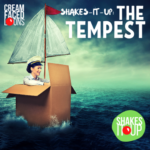
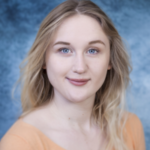 GEORGIA ANDREWS is an early-career actor based in London currently training at the Royal Central School of Speech & Drama. She has been active in the industry for 4 years, most of them spent performing Shakespeare, and is particularly interested in intersectional, accessible approaches to the ‘problem plays’. She was an applicant for the 2020 Poel Workshop.
GEORGIA ANDREWS is an early-career actor based in London currently training at the Royal Central School of Speech & Drama. She has been active in the industry for 4 years, most of them spent performing Shakespeare, and is particularly interested in intersectional, accessible approaches to the ‘problem plays’. She was an applicant for the 2020 Poel Workshop.
I was half-way through a run of Julius Caesar at the Space Theatre when the pandemic hit, and like many actors found myself in a precarious situation as cities locked down, theatres closed and work dried up. Five months later, things are still precarious; I’m particularly worried that financial constraint and inaccessible funding will make class, resources and lack of influential contacts even more of a barrier to early-career performers than they already were pre-lockdown.
That said, and though the situation remains difficult, this unambiguously grey cloud has also yielded unexpected silver linings. On a personal level, the chance to work on live, online Shakespeare has brought much-needed joy and adrenaline to my lockdown, allowing me to continue my professional development when all else feels at a standstill. Beyond that, it’s re-centred the community, power and necessity of art in bringing people together, reactivating my listening skills and imagination and reminding me of why I do it in the first place. Globally, and much more importantly in the grand scheme of things, the new theatrical genre emerging from lockdown has not only kept our industry alive but provided a blueprint for how it might look in the future.
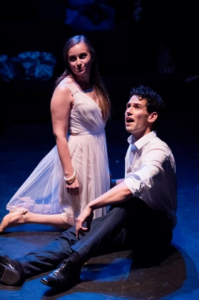 Since the start of the theatre shutdown, I’ve participated in six live online performances: Richard II and Julius Caesar with The Show Must Go Online; Cream-Faced Loons and Scram Collective’s playful Tempest web series; weekly scene practice and full-length readings from cue-script with Shake-Scene Shakespeare. Each production navigates the emerging digital form in a different way, each facing its own challenges, some voluntary and others commercial. One thing that unites all the companies mentioned is their will to create ‘Shakespeare for all’, taking his plays off the pedestal they were never intended to sit on and giving them back to the people for whom they were written. Several propel this ethos beyond words alone; Shake-Scene Shakespeare’s practice and outreach is rooted in the benefits of active-listening both on and off stage, while The Show Must Go Online (as a volunteer-based project) donate funds from their Patreon to participating actors in financial hardship as a result of the pandemic.
Since the start of the theatre shutdown, I’ve participated in six live online performances: Richard II and Julius Caesar with The Show Must Go Online; Cream-Faced Loons and Scram Collective’s playful Tempest web series; weekly scene practice and full-length readings from cue-script with Shake-Scene Shakespeare. Each production navigates the emerging digital form in a different way, each facing its own challenges, some voluntary and others commercial. One thing that unites all the companies mentioned is their will to create ‘Shakespeare for all’, taking his plays off the pedestal they were never intended to sit on and giving them back to the people for whom they were written. Several propel this ethos beyond words alone; Shake-Scene Shakespeare’s practice and outreach is rooted in the benefits of active-listening both on and off stage, while The Show Must Go Online (as a volunteer-based project) donate funds from their Patreon to participating actors in financial hardship as a result of the pandemic.
The Show Must Go Online in particular embodies all that Shakespearean performance could and should become when the time comes for mainstream theatres to reopen their doors. Committed to gender-balanced, diverse casting, they approach the ethical problems of staging Shakespeare in the twenty-first century with care, enthusiasm and the will to learn. Sydney Aldridge’s appropriate casting of The Merchant of Venice is an especially moving and necessary example which I hope subsidised theatres will learn from going forward.
Though they cannot provide a stable economic model for all future staged productions, I hope that the joy, community, equity and accessibility of all three examples discussed above is carried forward into the industry when it is time to return to work, and that the doors opened by lockdown to those who may not have been able to access Shakespeare in conventional spaces or stagings will remain open.
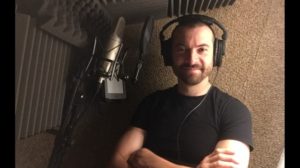
 Jonathan le Billon took part in the 2019 Poel Workshop and subsequently arranged a rehearsed reading of Shakespeare’s Venus and Adonis at the Westminster Library with some of his co-participants. He has been an actor on stage and in film and television for 27 years, making his acting debut at the age of 13. He toured for a year with theatre company Northern Broadsides and his TV work includes leading roles in Hollyoaks and At Home with the Braithwaites.
Jonathan le Billon took part in the 2019 Poel Workshop and subsequently arranged a rehearsed reading of Shakespeare’s Venus and Adonis at the Westminster Library with some of his co-participants. He has been an actor on stage and in film and television for 27 years, making his acting debut at the age of 13. He toured for a year with theatre company Northern Broadsides and his TV work includes leading roles in Hollyoaks and At Home with the Braithwaites.
Lockdown has been difficult, mentally and financially, but there are the means out there to adapt and survive. I won’t say ‘thrive’ yet, but hopefully that’s not too far away. And it also depends on how you choose to adapt. A friend followed my idea of reading the complete works of Shakespeare online – they do play readings over Zoom, are about halfway through, and get several thousand hits per week.
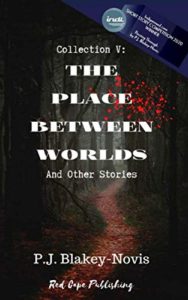 Personally, I’ve used the time to build a home audio-recording studio. With a lot of research, and a lot of patience, you can do this for not much money. I’ve had to watch a LOT of YouTube videos, force my brain to learn about many, many technical things (my actor brain has struggled with this), and ask some very kind friends for help here and there, but the result is: I’m currently producing my first professional audiobook to be released on Audible on Sept 13th. This is an avenue I really want to continue taking ‘post-Covid’.
Personally, I’ve used the time to build a home audio-recording studio. With a lot of research, and a lot of patience, you can do this for not much money. I’ve had to watch a LOT of YouTube videos, force my brain to learn about many, many technical things (my actor brain has struggled with this), and ask some very kind friends for help here and there, but the result is: I’m currently producing my first professional audiobook to be released on Audible on Sept 13th. This is an avenue I really want to continue taking ‘post-Covid’.
I’ve been encouraged by the self-employment furlough scheme. A friend is expanding his audio business because of this safety net. I personally took the first payment for security but am debating whether I need to take the second, as there are some part-time jobs starting to appear.
Overall, I’ve been an actor for 27 years and think (hope) we’ll be able to look back over this time as an interesting chapter, which allowed for some creative thinking outside of the box. I don’t think the industry will be returning to its pre-lockdown state for several years and, as difficult a trade as acting was before, I don’t see it getting any easier in the near future.
The business has struggled, the show has gone on.

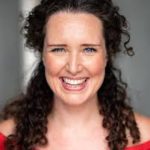 Charlotte Gallagher is an actress with experience in theatre, film, television and voice-over. Here she writes about what she has been doing during the closure of the theatres and the shutdown of film and television production studios. She also recalls her experience of the Poel Workshop 2017 when Erica Whyman and Paapa Essiedu were among the session leaders, and remarks on the STR’s Covid-19 Support Grants.
Charlotte Gallagher is an actress with experience in theatre, film, television and voice-over. Here she writes about what she has been doing during the closure of the theatres and the shutdown of film and television production studios. She also recalls her experience of the Poel Workshop 2017 when Erica Whyman and Paapa Essiedu were among the session leaders, and remarks on the STR’s Covid-19 Support Grants.
Early in lockdown, in a moment of searing carelessness, I suggested to a fellow actor that maybe all we needed to do now was follow Grotowski into the woods and explore what theatre really is. No need for cities, or theatres, or even outside audiences; let’s get pure and poor and holy and frolic in the forest. In my arboreal whimsy I’d forgotten that this actor had just started running a new West End theatre. His life and dreams were decaying before his eyes. His theatre was and, sadly still is, empty. He was asking the same question in a different tense, how can I keep the theatre alive?
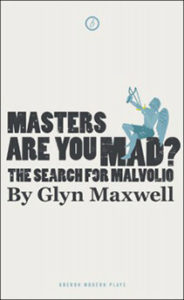 I retreated to the ivory tower safeties of intellectual and philosophical questions about theatre. I love to ask theatre-makers what theatre is and what actors are. Sometimes the answer is given suspiciously with underlined obviousness: “Well, all you need is one person to do something, and one person to watch.” But ask a poet and this is what you get: “Actors are angels. Theatre is the light in the woods” (Glyn Maxwell). Such a poet would host monthly virtual pub and play-reading events to house the swirling grief, fear and joy of this year as if he were the woods himself.
I retreated to the ivory tower safeties of intellectual and philosophical questions about theatre. I love to ask theatre-makers what theatre is and what actors are. Sometimes the answer is given suspiciously with underlined obviousness: “Well, all you need is one person to do something, and one person to watch.” But ask a poet and this is what you get: “Actors are angels. Theatre is the light in the woods” (Glyn Maxwell). Such a poet would host monthly virtual pub and play-reading events to house the swirling grief, fear and joy of this year as if he were the woods himself.
“Maybe there’s no need for us now. We’re not what’s needed now”, one actor said.
Maybe.
And yet I look back and see that I played a lot.
I acted in Shake-scene Shakespeare‘s performances of cue-scripted Shakespeare plays live-streamed to YouTube. (In this method actors study their parts solo and perform the play for the first time in front of an audience. It’s almost the perfect form for this moment and kudos goes to movement director, Alexandra Kataigida, for working out how to fight, kiss, kill and pass props through a zoom box.)
At the Clerkenwell Actor’s Studio we explored Arthur Miller’s A View from the Bridge. And don’t the great plays always manage to speak to and include our present moment? What are we willing to see, to acknowledge, or to ignore? What must be brought to light?
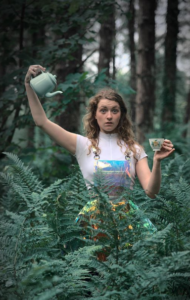 I talked to Galway Theatre Festival instead of performing my new show there. And later in the summer, further up the island, some friends created a new promenade adaptation of Alice in Wonderland for children in the Donegal woods while I played pirates with my toddling niece and nephew. At crisis points in the action (walking the plank, wrestling a crocodile, running away from a monster etc), they would fall down dead with the ‘birus’. In play we invented elaborate, revivifying medicines. They only worked if you administered them exactly the same way every time. I re-read The Way of the Actor by Brian Bates (I’d love to have gone to Rada in the 70s) and enrolled in a shamanic practitioner foundation workshop. I lay down in the beautiful death practice yoga nidra a lot and created my own to share. I comforted myself with thinking: theatre cannot die, it’s part of us, part of our humanity, we’ll always find our way to ritual and to sharing some way, somehow.
I talked to Galway Theatre Festival instead of performing my new show there. And later in the summer, further up the island, some friends created a new promenade adaptation of Alice in Wonderland for children in the Donegal woods while I played pirates with my toddling niece and nephew. At crisis points in the action (walking the plank, wrestling a crocodile, running away from a monster etc), they would fall down dead with the ‘birus’. In play we invented elaborate, revivifying medicines. They only worked if you administered them exactly the same way every time. I re-read The Way of the Actor by Brian Bates (I’d love to have gone to Rada in the 70s) and enrolled in a shamanic practitioner foundation workshop. I lay down in the beautiful death practice yoga nidra a lot and created my own to share. I comforted myself with thinking: theatre cannot die, it’s part of us, part of our humanity, we’ll always find our way to ritual and to sharing some way, somehow.
But why am I thinking about out-of-work costume-designers making PPE?
And then there was an email from a name I didn’t immediately recognise. Ah yes, vaguely familiar. Yeess. That incredible workshop I did years ago from another time, another world and it was free! And I got to play with Paapa Essiedu and Erica Whyman and loads of amazing people and Sam Yates who, of course, dared to make zoom theatre. They’re offering me financial relief and, if I don’t need it, (I don’t, for the first time in my career I’m perversely grateful for my unsuccess and loyal day job) the opportunity to pass that grant on to my friends who do – to those working actors we see on the telly, at The Globe, or the Nottingham Playhouse for example; we can’t remember their names but they really are extraordinary. These actors, these friends ,email me back to say thank you for passing that on and as I read their messages, impossibly, I sense the unconscious grip in them relaxing. They can get by a little while longer.
Thank you, Society for Theatre Research and the Poel Workshop, for helping to keep theatre alive.